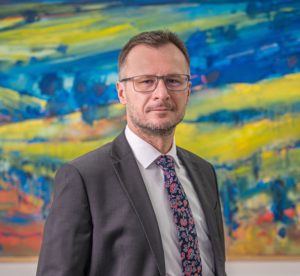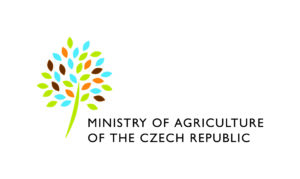Agriculture and food in the Czech Republic and the objectives of the
Czech EU Presidency
 Zdeněk Nekula Minister of Agriculture of the Czech Republic
Zdeněk Nekula Minister of Agriculture of the Czech Republic
Our agriculture and food industry is a traditional sector of the national economy. The most important group of crops grown in our country is cereals, which cover more than a half of the sown area. We are the world’s largest producer of aromatic hops, and we are also the world’s leading producer of poppy seed. We also grow oils seed crops, legumes, sugar beet, potatoes, hops, fruit, vegetables and vines, as well as medicinal and root plants and flowers. Livestock production is mainly focused on cattle, pigs, poultry, sheep and goats. Bee-keeping is also important, and fish and horse breeding are not insignificant. One of the subordinate organisations of the Ministry of Agriculture is the National Stud in Kladruby nad Labem, which is one of the oldest stud farms in the world and is home to the oldest original Czech horse breed, the Kladruber horse. It has been bred for more than 400 years and is the only breed in the world that was bred specifically to pull the carriages of emperors and kings. The uniqueness of the Cladruber Horse is confirmed by their status as a national cultural monument. Thanks to this, it is the only living creature in the Czech Republic under conservation protection, as well as under the protection of the Food and Agriculture Organization (FAO). In addition, since 2019, the landscape for breeding and training ceremonial carriage horses in Kladruby nad Labem has been included on the UNESCO list.
Specific to Czech agriculture is that it has the largest average farm size of all EU countries, 133 hectares. We have 15% of our agricultural land under organic farming and we are among the 15 countries in the world with the highest share of organically farmed areas in total agricultural land, and we are ranked 4th in the European Union.
In the Czech Republic, we produce quality food that is safe for consumers. The local food industry and its products have a long tradition, building on the craftsmanship and skill of our ancestors. Producers, large and small, are taking Czech food production to an even higher level with new, modern concepts. Consumers can navigate the range of food products on offer by quality labels such as “Klasa, Regionální potravina and Česká potravina”. The Ministry of Agriculture supports farmers’ markets, yard sales and local food. In the Czech Republic, as in the EU as a whole, food production, including beverages, is one of the main sectors of the manufacturing industry. Some food processing enterprises are directly linked to primary agricultural production, while others are involved in the finalisation of the resulting products.
Our Republic is trying to strengthen food self-sufficiency in the main commodities natural to domestic agricultural production. One of the most important export commodities is Czech beer. Its renowned name abroad helps export not only beer but also brewing technologies and raw materials for its production. The history of the Czech, as well as the world brewing industry, began in 1842 in Pilsen. The unique bottom-fermented pale lager from this West Bohemian town gave its name to the world’s best-selling type of beer (Pils, Pilsner). Thanks to its uniqueness, the whole world knows it as Pilsner Urquell. We also have a purely Czech, and at the same time world-famous brewery, the national enterprise Budějovický Budvar. Czech beer carries the Protected Geographical Indication label. We are also one of the world’s three largest hop producers. With over 80% of the world’s hops exported, Czech hops also form the quality basis of the world’s beers. The Czech Republic is also the country with the largest area of a single hop variety in the world, and our “Žatecký poloraný červeňák” (Hops of Saaz variety) is an indigenous variety with unique characteristics and quality.
As far as our landscape is concerned, we belong to countries with a high forest cover and a rich forestry tradition. Forests currently cover more than one third of the country’s territory.
The area of coniferous trees has been decreasing in recent years and the share of deciduous trees, especially beech trees and other broadleaves, has been increasing. This is due to the continuous efforts of foresters to achieve an optimal species composition of forests.
The Czech Republic took over the EU Presidency from France on 1 July, and I thank them for their work, which we will certainly build on in many ways. Our main objectives in the agricultural sector are climate protection, ensuring biodiversity, the development of sustainable farming and sustainable food production. The invasion of Ukraine by the Russian Federation has completely changed the geopolitical situation on our continent and has also demonstrated that the European Union is capable of a decisive response. The events of recent months have shown that Europeans can act very quickly, effectively and unitedly in a crisis caused by an external threat, perhaps to the surprise of outside observers. Because of the war in Ukraine, one of our most important tasks is to ensure sufficient food not only for Europe but also for the whole world. The war is having a huge impact on the agricultural and food sectors, and the Czech Presidency, together with the European Commission, will therefore be looking for ways to help these sectors. In order to ensure that we have enough food, we need to keep food production high quality and safe. We will therefore regularly monitor the situation on the commodity markets and at each Council of Ministers meeting, i.e. once a month, we will address this issue and take the necessary measures.
In order to prevent instability and possible shortages of certain commodities on the market in the European Union and in third countries, we must, first and foremost, continue to maintain open trade at global level, coordinate the activities of international organisations and address the rise in the prices of agricultural products, oil, energy and fertilisers with specific targeted measures. It is in our interest to act in unison within the Union and in synergy with other world leaders. During our EU Presidency, we will contribute to stabilising and creating conditions for the reconstruction of Ukraine, including in the field of food production and agriculture. Global partners and international institutions must be involved in a comprehensive recovery plan for the war-torn country. The abolition of import tariffs and import quotas for Ukrainian products improves the situation on the EU and global markets. It will allow Ukraine to free up warehouses for this year’s production. In this respect, all the activities under the solidarity lanes are also beneficial. The Common Agricultural Policy (CAP) also plays an important role in food security. Therefore, it is important to postpone the obligation to rotate crops and non-productive areas and to strive for flexibility within the CAP that will not further affect the wording of the national Strategic Plan for the Common Agricultural Policy and will not lead to a resignation to the objectives originally set.
Our next important priority will be to reduce the consumption of pesticides, which must be a task for the whole of Europe. According to the Farm to Fork Strategy, the whole Union should reduce pesticide consumption by 50% by 2030. We will lead the debate on the sustainable use of plant protection products so that this target is met with a fair distribution among all Member States. However, it is essential for Europe to be able to ensure that it can provide sufficient, high-quality and safe food for consumers, while protecting health and the environment.
The Czech Presidency will also focus on the prevention of deforestation. The European Commission is proposing to introduce a system under which companies would have to prove that the production of their products has not led to deforestation and the degradation of forests, especially rainforests. The idea is to prevent the unnecessary degradation of forests and woodlands due to the production of certain commodities. We need to protect nature sufficiently and, at the same time, when setting rules, make sure that we do not jeopardise the supply of certain products or foodstuffs because of new bureaucratic obstacles. A related theme will be the promotion of sustainable forestry, which is particularly important now during long periods of drought. The Czech Presidency will create a space for discussion on the future of the Standing Forestry Committee. The EU does not have a common forestry policy, so it is important to take into account the diversity of forests across the EU when managing forests.
We are in difficult times and we have many difficult tasks ahead of us, so we need to avoid any instability, and we will succeed if we act in a united way in the European Union and are able to find compromises.

Zdeněk Nekula, Minister of Agriculture of the Czech Republic


















